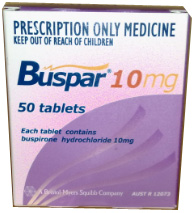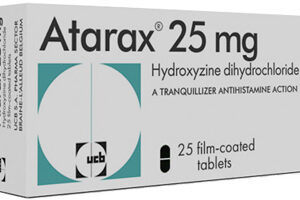Buspar Overview
Buspar, the trade name for buspirone hydrochloride, functions as an anxiolytic agent. Unlike benzodiazepines, it does not exhibit muscle-relaxant or anticonvulsant properties. Ordinarily, Buspar is prescribed for the management of anxiety disorders or short-term relief of the symptoms of anxiety. Its mechanism of action is not entirely understood, but it’s believed to involve neurotransmitters in the brain like serotonin and dopamine which play a role in anxiety and behavior. Notably, it is a non-sedative anxiolytic, making it a unique alternative to other medications used for anxiety.
Usage Indications
Buspar is indicated for the control of anxiety disorders or the temporary alleviation of symptoms of anxiety. Anxiety or tension associated with the stress of everyday life usually does not require treatment with an anxiolytic. Efficacy has been demonstrated in trials of 4 to 6 weeks duration; however, the long-term efficacy in the individual patient should be reassessed periodically.
Dosage Administration
Dosing of Buspar must be individualized. The typical starting dose is 7.5 mg, twice daily. Adequacy of dosage should be periodically reviewed and may be increased by 5 mg increments at intervals of 2-3 days, depending on clinical response and tolerability. The maximum daily dosage should not exceed 60 mg. Buspar should be taken consistently, either always with or always without food.
Contraindications
Buspar is contraindicated in individuals hypersensitive to buspirone hydrochloride. Additionally, concomitant use with monoamine oxidase inhibitors (MAOIs) can result in elevated blood pressure and is therefore contraindicated. Buspar should not be used in conjunction with severe renal or hepatic impairment due to a lack of sufficient clinical evidence supporting safety in these patient populations.
Precautions
Caution is advised when prescribing Buspar to patients with a known predisposition to drug-induced mania or hypomania. Additionally, patients with a history of substance abuse should be under careful surveillance when receiving Buspar. It is advised to avoid the use of large amounts of grapefruit juice, which can increase blood levels of buspirone. During pregnancy, Buspar should be used only when clearly needed, and it’s essential to discuss the potential risks and benefits with a healthcare provider.
Drug Interactions
Buspar has a potential to interact with drugs that inhibit or induce cytochrome P450 3A4. Notably, concurrent use of CYP3A4 inhibitors like ketoconazole, or inducers like rifampin, can affect buspirone plasma levels. Buspar can also interact with other central nervous system depressants, leading to increased drowsiness or CNS depression. Concomitant use with serotoninergic drugs may potentially lead to serotonin syndrome, a potentially life-threatening condition.
Adverse Reactions
The administration of Buspar can lead to several side effects. Most commonly reported adverse reactions are dizziness, nausea, headache, nervousness, lightheadedness, and excitement. Less frequently observed reactions can include anger, tinnitus, muscle cramps, and blurred vision. As with any medication regimen, any persistent or troublesome side effects should be reported to a healthcare provider.
Clinical Pharmacology
Buspar’s anxiolytic effects are not fully understood but may relate to its effects on serotonin, dopamine, and other neurotransmitter pathways. Buspar does not exhibit cross-tolerance with benzodiazepines, nor does it depress the CNS to a significant degree at normal doses. Its pharmacokinetics are nonlinear, meaning that with increasing doses there is a disproportionate increase in plasma levels. Buspar has a mean half-life of 2-11 hours and is extensively metabolized in the liver, primarily by oxidation.
Pharmacist’s Considerations
Healthcare professionals should counsel patients on the importance of taking Buspar consistently, as well as the need to avoid operating heavy machinery until they know how Buspar affects them. Pharmacists are in a position to remind patients about the importance of not abruptly discontinuing the drug without a doctor’s guidance and to avoid alcohol consumption while on Buspar treatment. Monitoring the patient’s overall medication regimen for potential interactions with Buspar is also essential.
Handling and Storage
Buspar should be stored at room temperature, 15°C to 30°C (59°F to 86°F). It should be kept in a tightly sealed container, away from light and moisture, and out of reach of children and pets. As with all medications, disposal should be done responsibly and preferably through a medication take-back program.
Information for Patients
Patients should receive comprehensive counseling on the use of Buspar. Instruct patients to take the medication as prescribed, without skipping or doubling doses. They should be aware that the full therapeutic effect may take several weeks to manifest and that sudden discontinuation may cause withdrawal-like symptoms. Patients should also be informed of the possible side effects and advised to contact their provider if they experience severe or persistent symptoms.
FAQs
Patients often have questions regarding the use and effects of Buspar. Common queries include the time frame for Buspar’s effectiveness, the potential for addiction or dependence, and the advisability of consuming alcohol while taking the medication. Patients should be reassured that Buspar is non-habit forming but also cautioned against the consumption of alcoholic beverages during treatment. Detailed responses to these and other pertinent questions help to provide reassurance and clarity for patients.
References
For a thorough understanding of Buspar’s properties and its place in therapy, referencing peer-reviewed studies, clinical trial data, and product monographs is crucial. Additionally, resources such as the FDA label for Buspar provide authoritative information regarding its indications, usage, contraindications, and other vital data. Healthcare professionals are encouraged to keep abreast of the latest research and guidelines to ensure the optimal use of this medication.


Reviews
There are no reviews yet.